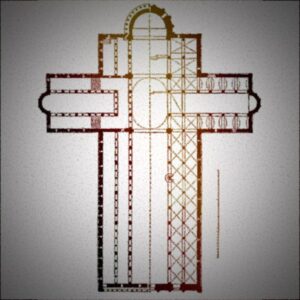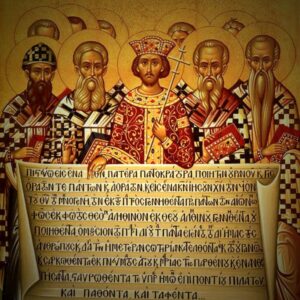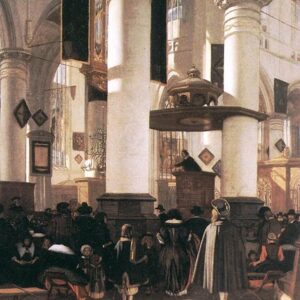
Our Identity
A Christian Church. The Catholic faith. The Reformed Doctrine.

A Christian Church
The Christian faith has at its centre the person and work of Jesus Christ. We believe that Jesus Christ is the Saviour of sinners and that whoever believes in Him receives, by divine grace alone, the freedom to live this life fully as a child of God and the sure promise of eternal life.
All our doctrine is derived from the Holy Scripture in which God revealed Himself in a special way to mankind and in which He revealed His Only Son Jesus Christ. We believe that the Bible is the infallible and authoritative revelation of God’s truth and is therefore our supreme rule of faith and life.
According to the Bible, we believe that in the beginning God created mankind in His image and likeness. Man and woman, adorned with all wisdom and virtue, were created to rightly know God, their Creator, to love Him from the heart, and to live with Him in eternal bliss, praising and glorifying Him. Tragically, man rebelled against God and brought misery and corruption upon himself, dragging with him the world in which God had placed him.
However, out of His infinite mercy, God promised us a Saviour who would redeem mankind from its condition of misery and sin. This Saviour is Jesus Christ, who after having been many times foreshadowed and prophesied in the scriptures of the Old Testament, became incarnate in the womb of the virgin Mary and became man. By his life of perfect obedience to the Father, by his sacrifice on the cross, and by his resurrection on the third day after death, Jesus Christ gained for all who believe in him the benefit of forgiveness, justification, adoption into the family of God, and eternal life.

A Catholic Faith
The adjective Catholic comes from the Greek katholikós and means ‘universal, general’. The faith we profess is the same Christian faith professed over the centuries by Christians through the so-called ecumenical symbols of faith. These symbols are:
- The Apostles’ Symbol (II sec. circa)
- The Nicene Creed (IV sec.)
- The Athanasian Creed (III sec. circa)
- The Creed of Chalcedon (V sec.)
We are a historic church that receives and preserves the heritage of theological wisdom that the Christian Church has produced since Apostolic times. We follow in the footsteps of the Apostles and the Church Fathers with respect, gratitude and awareness of both the victories and defeats of Christianity, not wishing to undo the illuminating work of the Holy Spirit through the ages, but drawing lessons from the testimony of our past leaders (Heb. 13:7).

A Reformed Doctrine
We are, moreover, a Reformed church that inherits the theology, piety and practice of the 16th century spiritual yearning movement known as the Protestant Reformation. Far from seeking to revolutionise the Christian faith, the Reformation sought to redirect Christian doctrine and practice back to their original form as expressed in the Bible.
We are reformed in that we believe that Scripture alone is the only rule of faith and conduct, and that we are saved by grace alone, through faith alone, by virtue of justification in Christ Jesus alone, for the glory of God alone.

The Reformed Church can be recognised because:
It is confessional because it adheres to a historical confession of faith elaborated with rigour and piety and proven by secular application in churches around the world.
It teaches the doctrines of grace: total depravity of man, unconditional election, special redemption, irresistible grace, perseverance of the saints. These doctrines are not an invention of the Reformation, but can be found throughout the history of the Christian Church and were taught in various ways by the early and medieval Church Fathers, such as Augustine of Hippo, Anselm of Aosta and Thomas Aquinas.
It teaches Covenant theology, also called Federal Theology (from fœdus, covenant): the Covenant of Redemption in eternity between the three Persons of the Trinity, the Convenant of Works in Eden with Adam, and the Covenant of Grace between God and man with the mediation of Jesus. The Reformed church applies Covenant Theology in the life of the church by administering the sacrament of baptism to believers and their children.
It is organised according to the Presbyterian governance model, in which the administration of the church is exercised by a council of presbyters at local, regional and national levels.
The doctrines we confess are set out in the confessions of faith and catechisms that have been in profitable use since the 16th century in the churches born out of the Reformation:
The Three Forms of Unity
- The Belgic Confession of Faith (1561)
- The Heidelberg Catechism (1563)
- The Canons of Dordt (1619)
The Westminster Confessional Documents
- The Westminster Confession of Faith (1646)
- The Shorter Catechism of Westminster (1647)
- The Larger Catechism of Westminster (1647-48)

«For the promise is for you and for your children and for all who are far off, everyone whom the Lord our God calls to himself.”»
Acts 2:39
